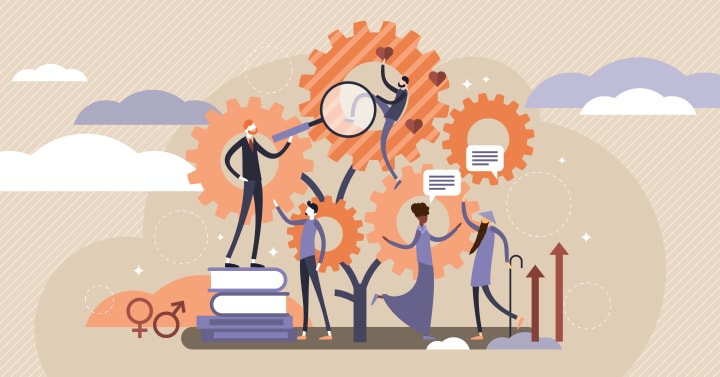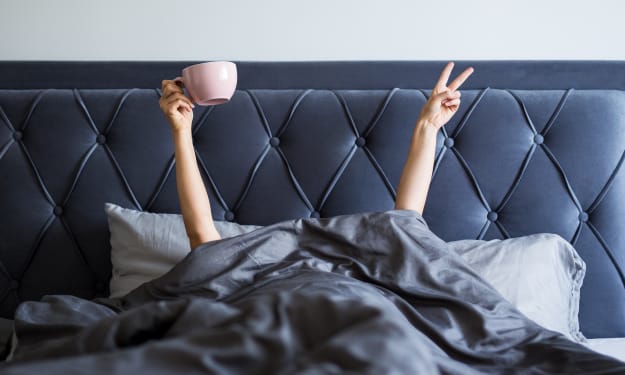How I'm Reaching My Health Goals This Year
I'm more than halfway through my health journey; if I can do it, you can too.

In 2018, I was at my personal rock bottom. I wasn't completely happy with the job I was working, the city I was living in. I was living in a tiny studio apartment with paper-thin walls. I tried to apply to graduate programs for the second time but failed. My target universities rejected me and my safety schools didn't offer enough aid for me to say yes.
On top of that, I was 60 pounds overweight with sugar levels and cholesterol ratios completely out of control. I wasn’t healthy and every doctor I saw made it a point to remind me of that. I felt like I didn't have the energy to do anything—not to enjoy my hobbies or to advance any of my goals in life.
I started turning it around in 2019 when I lost 30 pounds. In 2020, I shook off 17 more. I've got the stubborn last 13 to shake off here in 2021. Then, at long last, I'll be at my goal. I've been working on making permanent changes to the way I shop, cook, eat, and implement exercise in my life. I've got some key strategies I'm using this year to meet my overarching wellness goal.
I’m changing the way I see my body.

I was refilling my water bottle for the second time today and had a borderline shower thought — “my body is basically just a water-filtration system.” This is obviously a vast over-simplification, but it’s a small example of how I’m changing the way I think about myself.
I used to spend so much time thinking of my body solely in the ways society told me to. Though I’ve never been truly religious in my life, when I was younger, I did receive a Christian education. In my earliest years, I was told to “treat my body like a temple” and that my body is “a temple of God” and notions like that. I don’t want to get into a religious debate with anyone, we’re all free to believe in any faith we’re drawn to, but this kind of thinking awakened the youthful rebel in me and it made me not want to take care of my body. Completely illogical, but I was a rebellious kid and I didn’t want to accept this idea that made it feel like my body wasn’t really my own.
Society isn’t in charge of your body; you are.

Moving forward in time, I let society dictate my feelings on my body. When I was in middle school, I let myself believe I was too fat because I wasn’t stick thin. In college, I got into a "curvy is sexy" mindset — and I do believe every body is beautiful — but I can say with certainty that beauty aside, my body wasn’t healthy. This was when I started gaining weight rapidly and my health was declining. My sugar levels were through the roof, which is pretty bad considering I have a history of diabetes in my family, and my cholesterol was three times the level it should have been.
I was developing self-confidence and happiness with how I looked, which was good, and it’s something I hold on to now. However, I feel I personally let that go a little too far. In a way, I was still letting yet another movement in society dictate how I saw myself, and I ignored professional medical advice about my weight for a long time. There was no balance. There was no happy medium.
Now, I’m trying to see my body for what it is, without the rose-colored glasses of religion or any movement in society. I was at risk for a ton of different health conditions related to being significantly overweight. Many will argue, with some very good points, that BMI is not a perfect metric for determining if you’re healthy. However, whether you believe in BMI or not, there are a lot of other things to look at when determining if you’re at a healthy weight. There’s blood pressure, LDL and HDL cholesterol levels, triglycerides, and the dreaded blood sugar.
I’m looking at my body as a part of myself. I’m looking at it as the vehicle for my mind. I’m not obsessing over how it looks in the mirror — I want it to be at its optimal health, by all of those metrics, so that I can live as long as I possibly can with minimal health concerns. I want to spend as much time as I possibly can with my loved ones and do a whole ton of writing over my lifetime. I want to take care of my body in a way that will enable me to do both of those things.
I’m changing my relationship with food.

One of the hardest parts for me is no longer seeing food as a reward system. I used to be awful about this; I was constantly using sweets as a reward mechanism. I’d use food and dessert to motivate myself for that short term bit of productivity. I’ve always struggled with motivating myself, so it wasn’t unusual for me to try poor methods of motivation.
For example, in college, I would often handwrite short stories or chapters of my books when I was in between classes, when I was a passenger in the car, or pretty much any time I could spare to work on those creative projects. I’d have to type them up to add them to my digital manuscript and there were times that I was so demotivated, I’d put an M&M at the end of each paragraph. Once I finished typing up that paragraph, I’d eat the M&M.
The worst part is that I didn’t even identify this as problematic. I didn’t realize that I was creating a very unhealthy relationship between myself and food. Even once you know using food as a reward is bad, it takes time to change those habits you’ve built over years. I started researching what dieticians have to say about how to change the mindset of food as a reward.
One of the first steps is to draw the line on what counts as a big win and what doesn’t is important. Does typing up a paragraph count as a win? Probably not. Does finishing a novel? Now that just might.
It’s incredibly easy to think “I deserve this” every time someone brings doughnuts into the office, but that kind of thinking just reinforces food as a reward. Another method for breaking the food-as-reward cycle is to make a list of your most common food rewards and change them with non-food rewards. Instead of spending money on a food-reward, you might spend it on buying something that’s been on your Amazon wishlist for ages. If you’re looking not to spend money, you might reward yourself with a bubble bath or something relaxing along those lines.
I'm keeping an eye on my body's real caloric needs.

One of the misconceptions about dieting is that you’re always starving. At first, for me, it did feel like that. As you lose weight — ideally at a slow, responsible pace — your body’s caloric needs change. It’s a relief for me because I can eat smaller portion sizes that are appropriate for a person of my height and I’m perfectly satiated at the end.
To make this a little less confusing sounding, let’s talk about caloric deficits again. My caloric maintenance is the number of calories my body needs to function every day. There are a lot of different calorie calculators out there, but Healthline’s caloric needs calculator is based on height, age, weight, and activity level.
Knowing how much you should be eating is transformative.

At my heaviest, 165 pounds and at my modest height of 5’0”, my caloric maintenance number was 1,692 calories per day. To lose weight at a responsible pace, I needed to eat 1,354 calories per day.
At my current weight, 118 pounds, I only need 1,436 calories per day to survive. That’s just how few calories my body burns in a day. To lose weight and go lower than 118 pounds, I’d need to only eat 1,149 calories per day.
I strongly recommend running your own numbers; it’s easy, the website does all the math for you. It can be shocking to realize how few calories per day your body burns. The “an average of 2,000 calories per day” that you always hear could be dramatically more than your body needs to maintain your current body weight.
Beyond the simple calorie numbers, I never used to pay attention to things like micro and macronutrients. Ensuring that I'm having a good balance of proteins, carbs, and fats really helps to boost my energy levels during an ordinary day.
I'm finding types of exercise that I actually enjoy.

I started practicing yoga in 2018, which was one of my biggest steps toward living a comprehensively healthier lifestyle. My first experience with yoga was going to a free outdoor yoga class held by one of my previous employers. It was a fantastic program and the price was right for me, all participants had to do was bring their own mat. I bought a cheap yoga on Amazon, telling myself this $15 investment was me committing myself to a cause, and went to yoga.
Yoga has health benefits beyond the mat and that was made me want to give it a try. Though the pandemic changed my routines a lot, the focus on mindfulness really helps me enjoy yoga classes. Beyond that, if I do a class once or twice a week, I'm completely free of the back pain that used to plague me on long workdays.
I kept going and as I tried out different studios, I started to really value the focus on mindfulness. It really helps me feel motivated to go to yoga classes. I’m getting more out of it than just physical exercise, what I wrote off as spiritual nonsense at first became something I genuinely looked forward to. It helps me clear my mind and that’s something valuable.
On top of that, I started doing a simple routine of resistance training as a home workout. It only takes about 20 minutes and it actually helps boost my energy. Out of all these different methods I've used to lose weight, the biggest benefit I've felt is how much more energy I have. I'm not just getting through my days. I have the energy to properly live them and enjoy them.
Home workouts don’t sound enticing, but I’m serious about reaching my health goals this year. If I want to maintain my weight, keep my cholesterol and sugar in check, and work on my nutrition, I need to keep exercise part of my routine. These things might sound like a lot, but since this has been a three-year journey, I'm confident that I can keep it up.
About the Creator
Leigh Fisher
I'm a writer, bookworm, sci-fi space cadet, and coffee+tea fanatic living in Brooklyn. I have an MS in Integrated Design & Media (go figure) and I'm working on my MFA in Fiction at NYU. I share poetry on Instagram as @SleeplessAuthoress.







Comments
There are no comments for this story
Be the first to respond and start the conversation.